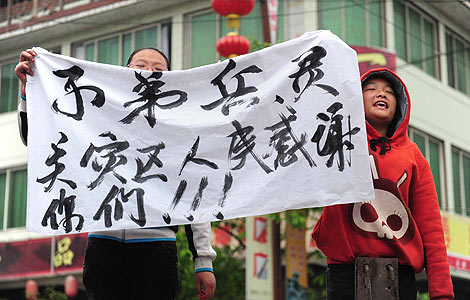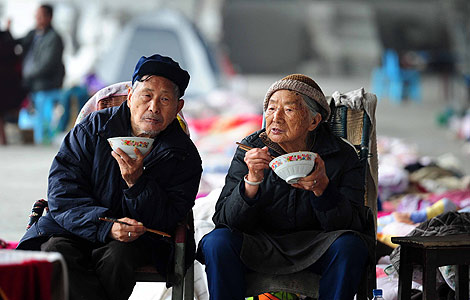China considers environmental tax to promote protection
Updated: 2013-04-24 11:23
(Xinhua)
|
||||||||
BEIJING -- To promote environmental protection, the Chinese government is considering introducing environmental taxes in the country's eco-compensation mechanism, an official said Tuesday.
The government is also planning to further a reform in the resource tax system as a measure to increase compensation for environmental protection and ecological preservation efforts, according to a report by Xu Shaoshi, head of the National Development and Reform Commission.
Xu delivered the report on behalf of the State Council to lawmakers attending the bimonthly session of the Standing Committee of the National People's Congress, China's top legislature, that opened in Beijing on Tuesday.
In addition to compensation drawn from central and local fiscal funds, China will also turn to more market-oriented systems, such as carbon trading, emissions trading and eco-labels, to encourage environmental protection, Xu said.
The eco-compensation mechanism refers to a system in which governments and the beneficiaries of others' environmental protection efforts pay for the protectors' costs and the potential losses they incur by refraining from developing.
According to a report from the NPC's Environment and Resources Protection Committee, loopholes in the country's current eco-compensation system have resulted in problems related to "poverty of a good environment" in some places.
Over the last 12 years, the annual investment of the central government in eco-compensation has grown from 2.3 billion yuan ($368 million) in 2001 to 78 billion yuan last year, with the total sum reaching 250 billion yuan, according to Xu.
The report said a preliminary framework of eco-compensation, which covers preservation of forests, grasslands and water resources, has shaped up in China.
The government has also set up a special fund for ecological management and restoration in the mine zones, it said.
Moreover, the government is giving financial aid to the efforts of wetland preservation, marine ecosystem restoration and protection of the country's key eco-functional regions, it added.
The eco-compensation mechanism has greatly invigorated the country's environmental and ecological protection initiatives and promoted the economic and social development of the less-developed areas, Xu said.
The scheme has helped to curb the trend of widening development gap between different regions in China, and the levels of basic public services, social security and people's livelihoods in the previously-underdeveloped regions have been improved markedly, according to the official.
However, the official also noted that as China steps up the industrialization and urbanization causes, the problems of resource constraints, environmental pollution and ecological degradation may worsen.
He urged to accelerate the construction of the eco-compensation mechanism, as the mechanism is an important safeguard to promote ecological progress in the country.
The report pledged increased investment in the eco-compensation, clearer definition of the rights and obligations of the environment protectors and beneficiaries as well as enhanced efforts to promote the awareness among the public.

 Children gathered together as healing process begins
Children gathered together as healing process begins
 Fears surface after hippo kills tourist from Shanghai
Fears surface after hippo kills tourist from Shanghai
 Rescuers win people’s hearts
Rescuers win people’s hearts
 Law to curb tourism price hikes
Law to curb tourism price hikes
 House damaged, life continues in Sichuan
House damaged, life continues in Sichuan
 Relief reaches isolated village
Relief reaches isolated village
 Rainfall poses new threats to quake-hit region
Rainfall poses new threats to quake-hit region
 Funerals begin for Boston bombing victims
Funerals begin for Boston bombing victims
Most Viewed
Editor's Picks

|

|

|

|

|

|
Today's Top News
Industry faces recovery fight
China's 2nd aircraft carrier will be 'larger'
China thanks countries
for quake relief aid
China, US to enhance mutual trust
Beijing protests Diaoyu incident
Copyrights take a bite out of Apple
Four new H7N9 cases
Landslide kills 9 in SW China
US Weekly

|

|






